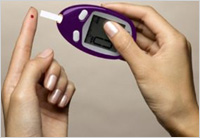Top 6 survival skills for diabetes
18 Dec 2012 (Health Me Up): Diabetes affects millions of people and is a very serious lifelong health problem. However, keeping diabetes in control is a difficult task as more than half of the care for diabetes is self driven.
 This makes it important to be self-aware, and skilled in these care methods. Today, on World Diabetes Day 2012, Ms. Sunita Pathania - Sr. Registered Dietician and Diabetes Educator, Healthy Living DietClinic, Mumbai, shares a few steps to help you manage diabetes better.
This makes it important to be self-aware, and skilled in these care methods. Today, on World Diabetes Day 2012, Ms. Sunita Pathania - Sr. Registered Dietician and Diabetes Educator, Healthy Living DietClinic, Mumbai, shares a few steps to help you manage diabetes better.
Survival step 1: Diabetes and its treatment
Diabetes is a condition that causes high blood sugar. It cannot be completely cured but it can definitely be managed. There are basically two types of diabetes, the first being Type 1 diabetes, wherein the body’s immune system destroys the insulin producing cells in the pancreas. Due to low insulin level, it is treated with daily insulin injections and a healthy diet. The second type is Type 2 diabetes, here the pancreas does not produce enough insulin or does not use insulin efficiently. It is treated by implementing a diet modification, exercise plan or oral medication.
Survival step 2: Time-to-time medication
Medicines and injections are very important to manage your diabetes level. Whichever medicines your doctor prescribes for you, take detailed information about its dosage, and follow it the way advised by your doctor. Whenever you make any appointment with any healthcare professional, take the list of all the medicines you have been advised to manage your diabetes level, to avoid any medicinal complications.
Survival step 3: The right FOOD
You need to take heed to what you eat to manage diabetes. Follow a diet planned for you by your dietician to maintain your weight and to lower your blood sugar. Never skip meals and eat three small meals to keep blood sugar level in control.
Survival step 4: Self-tests
Testing your blood sugar is the next important thing to do. This will give your healthcare the necessary information required so that he can balance between your diet, physical activity and medications accordingly. If your blood sugar falls below 70 or is above 240 more than two times in a week then call your doctor.
Survival step 5: High and low blood sugar
An unbalanced blood sugar level can lead to serious complications. If your blood sugars are low (less than 70) treat it immediately with 15 grams of carbohydrates like 3-4 glucose tablets, ½ juice or 1 cup skimmed milk. After this wait for 15 minutes and retest your blood sugar level. If it is still low then treat it again with 15 grams of carbohydrate. Whereas, if you have high blood sugar level, then test your blood sugar every 4 hours, drink at least 8 glasses of water to prevent dehydration and consume 45-50 grams of carbohydrates every four hours. Examples of 45-50 grams of carbohydrates are orange or grape juice 1 ½ cups, canned fruit 1 ½ cups, toast 3 slice and regular yoghurt 1 cup.
If you have type 1 diabetes and your blood sugar is greater than 240, test for ketones at every meal.
Survival step 6: Preventive exams
Prevent small cuts to convert it into major complications. If you are a diabetic patient even tiny cuts can develop into a major infection that may require amputating that part of your body. Hence, check your feet daily. Go for an eye check up and complete body check up to prevent long term complications.




 Write Comment
Write Comment E-Mail To a Friend
E-Mail To a Friend Facebook
Facebook Twitter
Twitter  Print
Print 














